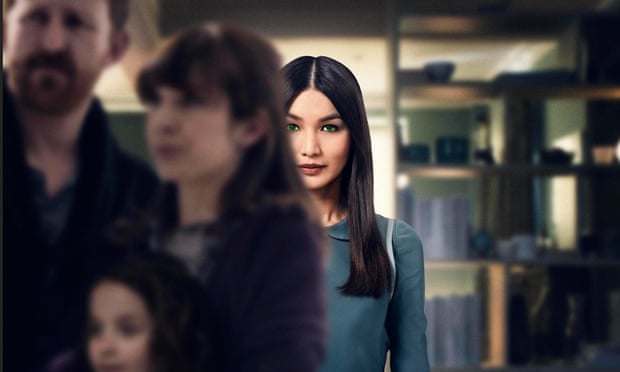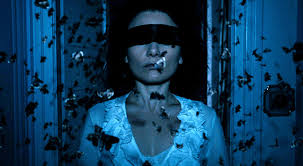Tuesday, July 28, 2015

It’s a pleasure to have a seriously challenging sci fi series on tv. Not the futuristic, philosophically hard-wired, Interstellar-style but creeping, unsettling daily life sci fi. We have two Roombas in this French house. They are programmed to come on and vacuum floors in the period between coffee in bed and being up and about. They speak several languages. We prefer English. One had ‘her’ being reprogrammed by my twenty month old grandson to speak in Spanish and start work at lunchtime. These magnificent non-sentient disks of hard labour are as far removed from sexual appeasement as can be conceived. Not so in Humans Channel 4. The blurred lines between android or ‘synth’ and ourselves cause moral mayhem. Picking up the same theme that is core to the film Ex-Machina, reviewed earlier, the viewer is forced to question whether, if in every possible way except being built of flesh and blood, a synth acts human, then shouldn’t we treat it as such and get on with congenial cohabitation. Humans provides the viewer with a variety of synths upon which to meditate, from lackey to sex worker to the fully conscious (and, in some cases enigmatically seductive). It is unsettling. You both identify with the faulty, imperfect error-prone human beings and at the same time are drawn into the plight of these newly created creatures with their Munch-like screams of human consciousness locked inside. The plot is great. It’s full of the unpredictable. There are good lines. If you have missed it, watch the re-run or rent the set from Netflix when it arrives.
No comments
Friday, July 3, 2015

Under the Skin, with Scarlett Johanssen in a quease-making central role, underlines one of the age old adages of cinema – first class novels make second class films and vice versa. I’d read the book before seeing the film. The result was curiously schizophrenic. Watching the movie was overlaid by hovering images that had remained with me from the book. These two bands of experience were almost completely different. It was only afterwards that I could tease out one from the other. While the book is a little above average, the film is innovative, shot largely in darkness and with an eerie, neck-tingling soundtrack. Using only a twisted fragment of its source material it creeps insidiously under your guard. It’s great cinema if you want your horror cerebral and you prefer not to be spoon-fed with predictability.
No comments
Friday, July 3, 2015
Would you be happy if your child married an android?

When you meet someone new, your bio-chemistry does an autonomous evaluation: do I fancy her? is there something dangerous about him? will we get on? etc. The overriding sense of the interaction boils down to authenticity. Can I believe this other person enough to trust him or her? Maybe we can be friends – or more. Alan Turing (the subject of The Imitation Game where he is played by the excellent Benedict Cumberbatch) is a kind of hero in Sci Fi in that he suggested a methodology for testing an android or robot to discover whether or not it is sentient and, therefore, human. Ex Machina is a film which pivots on this methodology. It is a philosophical tale of horror where there are strange inversions of the Beauty and the Beast motif. It calls into question our assumptions and attitudes towards ‘others’. The film, The Matrix, was a winner partially because it is based on what many science-philosophers believe to be a possible reality (that we are just clever scripts in an advanced computer program) and in the same way Ex Machina (like Blade Runner before it) asks us whether, if Turing’s tests for sentience are passed, could we eventually treat androids as fellow humans? The film is a discourse on this enigmatic theme, with enough blood and guts to oil the cogs and wheels of its artificial beings. It’s good. It’s chilling. It makes you wonder about the nature of the species.
No comments
Friday, July 3, 2015

I’m much the same age as Bob Dylan and he has grown and changed beside and in front of me all my life … (I first heard his ‘protest’ songs a year after Russian ships approached Cuba and I had waited in panic for the US to broadcast a four minute warning to the world that a nuclear strike had taken place). His genius as a poet, soothsayer and philosopher to capture in songs what has preoccupied me as I have wrestled with the deeper, more intimate questions of the here and now, is matched only by his refusal to wear the straitjacket of a fixed sense of self. Freewheelin’ Bob Dylan, after all our years together, still symbolises liberation from the shackles of my own or anyone else’s expectations of what I can or cannot be.

No comments
Friday, July 3, 2015

Our fingerprints, our retinal configuration and all else about us are unique, including our perceptions, dreams and fantasies. Even so we talk about being ‘normal’ as though it is a virtue. Society pressgangs us into conformity. To stray outside the fencing that society erects to herd us along the path of life is to risk certain vilification.
When I directed a research study many years ago into the behavior of children playing computer games in their homes, an unanticipated by-product of the data gathering was the complete lack of pattern across families’ behaviors. 100 families equalled 100 eccentric ‘cultures’. Once inside the front door of a house rules seem to be invented and invoked, either explicit or implicit, which each family regards as normal and acceptable. It is a conundrum. Society values highly the sacred autonomy of family life but still demands the gloss of public conformity. Only when behaviour spills over into the socially unacceptable are front doors breached. Yet, under the guise of household normality, the bizarre, the strange and the problematic co-exist without constraint. It seemed in our research that no two families were remotely alike. We couldn’t cluster them in categories. Yet, in all their wondrously divergent ways, they created viable and relatively stable habitats, no matter how outlandish they might appear when one examined the detail.
The Duke of Burgundy is a film about intimacy. What is depicted in its slow, erotic flow is a range of behaviours between two women which necessitates keeping the front door firmly shut. They do together what their obsessions demand of them. Their ‘normality’ is not a recognizable one. It has a recurring life cycle, like the butterfly of the film’s title, with alternating phases of sexual dominance and subservience that reach a crescendo before beginning all over again. Wonderfully filmed in deep shadows and claustrophobic rooms, close up and intense, it is a terrific cinema.
We all think we know what love is. We may be daft enough to think that others experience it as we do. The film, like the research mentioned above, suggests otherwise. The love of the two women is unlike anything society might imagine as normal. Yet it is definitely and unequivocally love.
No comments


